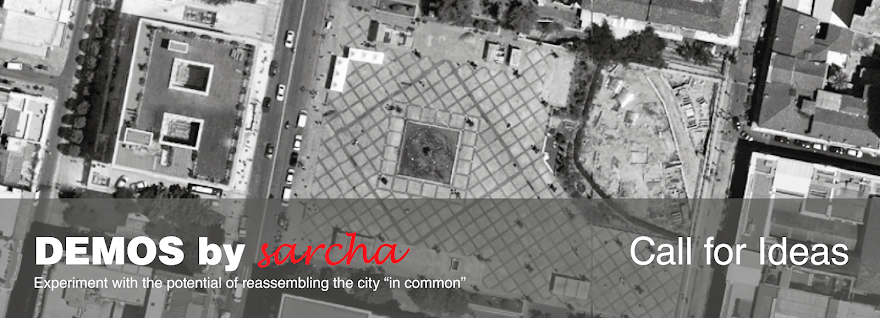When asked to make a submission for an official representation of Greece in the London Festival of Architecture (LFA2013) exhibition the Atlas of an Unbuilt World, the Athens based School of Architecture for All (SARCHA) responded with a counter proposal.
Taking into consideration people’s political mobilization in public spaces/squares (occupy movement, indignatos etc), SARCHA associates decided to launch an open architecture competition and ask architects and non architects to design / imaging / describe the connection of the Athens Town Hall with the adjacent Kotzia square in a way that the municipal building (the actual site of administration) is incorporated into the open square and is turned into a landscape of potentiality for self-government.
Since 2008, there is an ongoing mobilization of the Athens inhabitants who reclaim disused open spaces and buildings and work to transform them into gathering places to meet and debate. Alongside political mobilization that seeks to invent a new type of living ‘in common’, a trendy new age activism of the ‘love your clean and safe city’ type is on the rise shadowed by brutal neo-nazis’ ‘hate for immigrants’ racist cleansing. The official response to such mobilization – including architectural commissions/competitions for public spaces - are falling short in providing a ‘vision’ for the city based on the emerging potential of assembling the city ‘in common’.
The task for architects and non architects alike is to experiment, bring forth and materialize current aspects of the concept of demos and invent a ‘structure’ that gives shape and activates the transformative political power of the Athens inhabitants. It should be reminded here that the Cleithenis (Κλεισθένης) political reform in 507/6 BC Athens was devised as a “master plan” for the Athenian demoi [Pierre Lévêque, Pierre Vidal-Naquet, Cleisthenes the Athenian: Cleisthenes the Athenian: An Essay on the Representation of Space and Time in Greek Political Thought from the End of the Sixth Century to the Death of Plato (ΝΥ: Humanity Books 1997) and http://en.wikipedia.org/wiki/Cleisthenes].
The challenge for participants would be to consider the possibility that today’s cities could be shaped by forms of dissent or even insurgencies and experiment with the potential of reassembling the city ‘in common’. In drafting their entries, they are encouraged to treat the building, the square and the streets as a ground to be shaped and in which restrictions do not apply.
This is intended as an ‘ideas’ only competition for it seeks to fully exploit the unrestricted inventive power that the condition of the un-built currently holds for architecture and for thinking in general. For, as SARCHA’s brief for its 2008 Un-built programme http://www.byzantinemuseum.gr/unbuilt/unbuilt.htm stated, “…the ‘un-built’ is that which cannot be built or awaiting to be built as much as that which is drawn and discussed but not meant to be realised. It indicates a state of abjection and repression designates a condition of potential conflict and holds the promise of transformation”.
